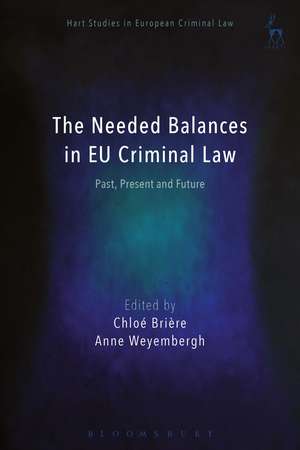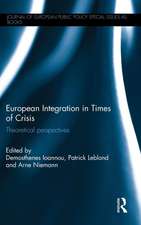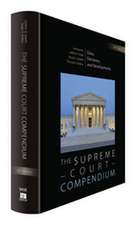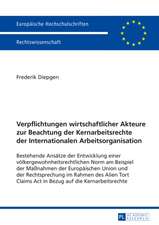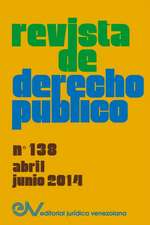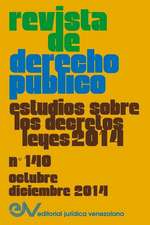The Needed Balances in EU Criminal Law: Past, Present and Future: Hart Studies in European Criminal Law
Editat de Chloé Brière, President Anne Weyemberghen Limba Engleză Paperback – 29 apr 2020
| Toate formatele și edițiile | Preț | Express |
|---|---|---|
| Paperback (1) | 409.90 lei 43-57 zile | |
| Bloomsbury Publishing – 29 apr 2020 | 409.90 lei 43-57 zile | |
| Hardback (1) | 839.01 lei 43-57 zile | |
| Bloomsbury Publishing – 27 dec 2017 | 839.01 lei 43-57 zile |
Din seria Hart Studies in European Criminal Law
-
 Preț: 147.01 lei
Preț: 147.01 lei - 28%
 Preț: 374.46 lei
Preț: 374.46 lei - 22%
 Preț: 264.45 lei
Preț: 264.45 lei -
 Preț: 306.94 lei
Preț: 306.94 lei - 30%
 Preț: 607.18 lei
Preț: 607.18 lei - 30%
 Preț: 567.99 lei
Preț: 567.99 lei - 18%
 Preț: 322.33 lei
Preț: 322.33 lei - 34%
 Preț: 511.97 lei
Preț: 511.97 lei - 18%
 Preț: 322.80 lei
Preț: 322.80 lei - 22%
 Preț: 272.23 lei
Preț: 272.23 lei - 22%
 Preț: 270.57 lei
Preț: 270.57 lei - 18%
 Preț: 322.60 lei
Preț: 322.60 lei - 30%
 Preț: 571.66 lei
Preț: 571.66 lei - 30%
 Preț: 835.93 lei
Preț: 835.93 lei - 22%
 Preț: 257.97 lei
Preț: 257.97 lei - 18%
 Preț: 306.94 lei
Preț: 306.94 lei - 18%
 Preț: 308.74 lei
Preț: 308.74 lei - 18%
 Preț: 306.47 lei
Preț: 306.47 lei - 18%
 Preț: 323.84 lei
Preț: 323.84 lei - 22%
 Preț: 273.06 lei
Preț: 273.06 lei - 18%
 Preț: 300.98 lei
Preț: 300.98 lei - 18%
 Preț: 299.55 lei
Preț: 299.55 lei - 18%
 Preț: 299.01 lei
Preț: 299.01 lei - 28%
 Preț: 466.81 lei
Preț: 466.81 lei
Preț: 409.90 lei
Preț vechi: 563.12 lei
-27% Nou
Puncte Express: 615
Preț estimativ în valută:
78.43€ • 82.11$ • 64.90£
78.43€ • 82.11$ • 64.90£
Carte tipărită la comandă
Livrare economică 07-21 aprilie
Preluare comenzi: 021 569.72.76
Specificații
ISBN-13: 9781509937493
ISBN-10: 1509937498
Pagini: 472
Dimensiuni: 156 x 234 mm
Greutate: 0.65 kg
Editura: Bloomsbury Publishing
Colecția Hart Publishing
Seria Hart Studies in European Criminal Law
Locul publicării:London, United Kingdom
ISBN-10: 1509937498
Pagini: 472
Dimensiuni: 156 x 234 mm
Greutate: 0.65 kg
Editura: Bloomsbury Publishing
Colecția Hart Publishing
Seria Hart Studies in European Criminal Law
Locul publicării:London, United Kingdom
Caracteristici
This is the first collection to look at the questions on limits on EU criminal law across all sectors, both constitutional and substantive.
Notă biografică
Chloé Brière is Associate Member of the Centre for European Law at the Université Libre de Bruxelles, and Member of the European Criminal Law Academic Network (ECLAN). Professor Anne Weyembergh is President of the Institute for European Studies at the Université Libre de Bruxelles, and Co-coordinator of the European Criminal Law Academic Network (ECLAN).
Cuprins
Part I: Introduction1. Introduction by Vera Jourova, EU Commissioner for Justice, Consumers and Gender Equality 2. Introduction by Minister Koen Geens, Minister of Justice, Belgium3. Introduction by Minister Félix Braz, Minister of Justice, Luxembourg 4. Introduction: About ECLAN and the Balances that Need to be Struck in EU Criminal Law Chloé Brière and Anne Weyembergh (Editors)Part II: The Quest for the Right Balance in the Institutional Design/Between the EU and the Member States and Between the EU Institutions5. The Evolution of Competence Distribution Between the European Union and the Member States in the Criminal Field Samuli Miettinen6. 'The Evolution of Competence Distribution Between the EU and the Member States in the Criminal Field' (by Samuli Miettinen)-A (Short) Reaction Pedro Caeiro7. The Principle of Subsidiarity in EU Criminal Law Irene Wieczorek8. Challenges Facing the Academic Community: A Practitioner's Point of View in Reaction to Irene Wieczorek's Paper Eugenio Selvaggi9. Stepping into Uncharted Waters No More: The Court of Justice and EU Criminal Law Adam Lazowski10. The Evolution of the Relationship and Balance Between the Different EU Institutions Emilio de CapitaniPart III: The Quest for the Right Balance Between Diversity and Unity11. The Issue of Mutual Trust and the Needed Balance Between Diversity and Unity Daniel Flore12. The Sensitive Relationship Between the Different Means of Legal Integration: Mutual Recognition and Approximation Annika Suominen13. Mutual Recognition in EU Criminal Law and Fundamental Rights-The Necessity for a Sensitive Approach Anze ErbeznikPart IV: The Quest for the Right Balance Between Liberty and Security14. The External Dimension of Mutual Trust: The Coming of Age of Transatlantic Counter-terrorism Cooperation Valsamis Mitsilegas15. The Role of the Data Protection Authorities in Supervising Police and Criminal Justice Authorities Processing Personal Data Paul de Hert and Juraj Sajfert16. 'Foreign Terrorist Fighters'-De-Radicalisation and Inclusion vs Law Enforcement and Corrections in Denmark Jørn Vestergaard17. A New Hope? The Court of Justice Restores the Balance Between Fundamental Rights Protection and Enforcement Demands in the European Arrest Warrant System Leandro Mancano18. Mutual Recognition and Cross-Border Interception of Communications: The Way Ahead for the European Investigation Order Lorena BachmaierPart V: The Quest for Balance Regarding Criminal Justice Actors and in Their Mutual Relations19. A Comparison of the Evolution and Pace of Police and Judicial Cooperation in Criminal Matters: A Race Between Europol and Eurojust?Sabine Gless and Thomas Wahl20 The Cooperation Between Police and Justice at the EU Level: The Representative Example of Joint Investigation Teams Anne Weyembergh, Inés Armada and Chloé Brière21. The Draft Regulation on the Establishment of the European Public Prosecutor's Office-Issues of Balance Between the Prosecution and the Defence Hans-Holger Herrnfeld22. The Material Scope of Competence of the European Public Prosecutor's Office: Lex uncerta and unpraevia? John A.E. VervaelePart VI: Conclusion23. Afterword(s) on Mutual Recognition and the Respect for Fundamental Rights Revisited-Following the Judgment in Aranyosi and Caldararu Judge Lars Bay Larsen
Recenzii
This detailed volume, comprising some 23 chapters over six parts, aims to address the most potent questions arising in the field of EU criminal law today... the editors were able to draw upon an impressive range of expertise from academia and beyond... The resulting blend of law and policy insights on the history and future of EU criminal justice elevates the breadth and depth of the collection.
[T]he book is not only a valid tool for academics, but may also serve as a reference for EU practitioners and actors working on amendments or drafting of EU criminal law instruments.
The volume edited by Brière and Weyembergh present itself as a key milestone in the development of EU criminal law scholarship. A 'must read' for anyone interested in this everchanging field of study.
[T]he book is not only a valid tool for academics, but may also serve as a reference for EU practitioners and actors working on amendments or drafting of EU criminal law instruments.
The volume edited by Brière and Weyembergh present itself as a key milestone in the development of EU criminal law scholarship. A 'must read' for anyone interested in this everchanging field of study.
